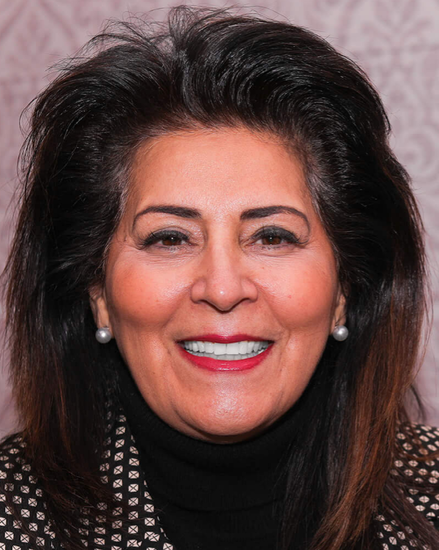Two vie for Democratic line to replace retiring comptroller Conners
ALBANY COUNTY — After 25 years years of fierce independence and a flare for grandstanding, Albany County Comptroller Michael Conners announced last fall that he would not pursue another term in office.
Battling it out in the June 25 primary to replace Conners on the Democratic line this fall — and in every practical sense, becoming the county’s next comptroller — are Albany City Treasurer Darius Shahinfar and Chief City Auditor Susan Rizzo.
Shahinfar has been the city’s treasurer for five-and-a-half years. Rizzo was appointed chief city auditor the day after winning the September 2017 Democratic primary and then won the seat outright just a couple of months later in the general election.
Shahinfar and Rizzo were asked about their reasons for running as well as their qualifications for the job, and these questions:
— A comptroller is in effect an umpire, calling balls and strikes — pointing out where financial malfeasance may be occurring but can’t do much about it.
How do you give the office teeth?
— Among its responsibilities, the office of the comptroller monitors and accounts for the county’s spending, but the office also conducts inquiries into the effectiveness of government policies.
Which areas of the Albany County government do you feel need closer scrutiny?
— Your soon-to-be predecessor has said: “I don’t care if they’re a Marxist, Socialist, communist, fascist — whatever they are — they must be independent of the county legislature and executive.”
How will you maintain your independence from the county legislature as well as a county executive, and can you give me an example of a time where you’ve bucked the party line and displayed independence on an issue?
— Michael Conners came out a while back and said that the city of Albany — as well as other municipalities — could get a better deal on its banking services if it competitively bid out the process like the county does.
— Is he correct?
— What is Albany County’s bond rating?
— What is the city of Albany’s bond rating?
— Your soon-to-be predecessor has been in office for nearly 25 years, that’s a lot of stability and accrual of institutional knowledge by employees.
Do you plan on keeping the office’s employees or will you clean house?

Darius Shahinfar
Darius Shahinfar is running for comptroller because, he said, “At the core, I like making government work.” And with an open office, he felt that he could bring his five-and-a-half years of experience as the city of Albany’s treasurer “to try and make county government work as best as it can.”
His time as the city’s chief financial officer as well as his background in law, Shahinfar said, qualify him to be the county’s next chief financial officer.
The job duties, he said, are “essentially the same”: responsibility for accounts receivable and payable; ensuring the books are kept in order, which, in Shahinfar’s time as treasurer, has meant five independent audits and “five clean opinions”; investing the municipality’s excess funds; and issuing municipal bonds.
“I’m a lawyer by trade, which, I think, has proven quite useful in my position as treasurer,” he said. “Basically, because everything we do in government has a legal basis to it.”
Over a number of years, Shahinfar said, offering an example, the city had built up a backlog of 60,000 unpaid parking tickets. The unpaid fines had yet to be sent to a collections agency, and, so, Shahinfar said, he wanted to give people the opportunity to pay off their tickets before the collections agency started tacking fees on top of the fines.
The idea was to let people pay the original fine and instead of paying a late fee, they could bring food to donate to local food pantries, but, he said, the New York State Constitution said otherwise. “You can’t just convert an obligation owed to a municipality into something else,” Shahinfar said — in this case, a fine for food, even if the recipient is a not-for-profit.
After parsing through the legalities, he said that the city was able to take in $300,000 in past-due fines and food pantries were able to receive 3,000 pounds of food.
“We’re responsible for billing the developers for their payment in lieu of taxes, or PILOT payments,” Shahinfar said, offering another example of his legal background making the city money, and it was determined that developers weren’t paying the library portion of their PILOT payment.
Mayor Kathy Sheehan had begun raising questions about the problem when she had been the city’s treasurer, he said, but she was told, “This is the way it’s always been,” he said, and no one knew why the library wasn’t getting its cut of the PILOT payments
When he got into office, Shahinfar said, he was able to dig into the state’s statutes and found that developers were obligated to pay the library portion of their PILOT payment. And, when he went back and looked at the contracts the city had with developers, he found nothing that said they were exempt from the library payments. The library, he said, had also been working on the issue
“I mean, it’s nothing too earth-shattering,” he said, but, since developers have been forced to make their entire PILOT payments, the library has been taking in another $500,000 in revenue.
The role of the comptroller, Shahinfar said, has the obvious day-to-day obligations, for example, making sure that the money of the people of Albany County is properly accounted for.
“The larger portion of [the role],” he said, “I think, comes from the auditing function.” When properly done, he said, auditing can enhance municipal operations. “I think, really at its core, the role of the comptroller’s office is to help municipal government operate more efficiently, more smoothly,” he said.
On the comptroller being a referee, not being able to do much more than pointing out financial malfeasance, Shahinfar said, “I will say, if you’re going in there looking for malfeasance, I think you’re approaching [the job] the wrong way. Because it’s not necessarily malfeasance you’re looking [for],” it’s improving the system and making it work better.
Asked how to improve the system, Shahinfar said it’s about communication, finding out what the administration and its departments feel are the risks or issues that need to be addressed. Also, he said, a comptroller needs to understand how the system works, how county government works in order to have processes and procedures if, for example, an audit reveals wage theft or workers filling up their cars with municipal gas.
“I think a lot of it has to do with cooperation from the audited,” which, he said, can be achieved by working with people, by letting them know an audit is not an investigation.
And, if it gets to the point where there is a serious problem that has been identified, and still nothing has been done, then it becomes more of a political problem and becomes time to alert the media.
Shahinfar said that county government needs the most scrutiny where it is most at risk financially — the administration and expenditure of federal dollars, which make up about 10.5 percent of the county’s revenue, the smallest of the five revenue line items. A “huge role of county government,” he said, is administering the food-stamp program, providing Medicaid, and running the nursing home as well as government-subsidized housing.
Shahinfar’s bucking of the party line, he said, is more a break with the party’s ascendant left wing. “I sit on the IDA for the city,” Shahinfar said, referring to Albany Industrial Development Agency and Capital Resource Corporation, which is tasked with fostering local development — most notably, by giving tax breaks to developers.
“It’s almost becoming an article of faith among many in the liberal [and] progressive community,” he said, “that IDAs are terrible things, and that all you’re doing is giving all this money to developers — it’s terrible and awful.
His frustration is compounded, “particularly with the media,” who, Shahinfar said, tend to assume that, because something bad happened at an IDA somewhere else in the state, then it must be what is happening in Albany “where we worked very hard to institute best practices to make sure that the taxpayers are getting value for the projects that we approve. And that we are doing things in a way that balances the risk and the need for development in our city.”
Citing an example of his independence, Shahinfar said that he’s run for office a few times, usually without the party’s blessing. But in the race for comptroller, he said, “I have the party blessing, which I won in a floor vote, and I still have people from within the party working against me on this, even though I did all the things they told me I was supposed to do.”
Responding to Conners’s backhanded endorsement: “I’d rather have [Mayor] Kathy Sheehan pick my successor than have [County Executive] Danny McCoy pick my successor,” Shahinfar had enough of a sense of humor to laugh at the quote. He admits that he’s had a lot of disagreements with Conners over the years, but two things in which Shahinfar agrees wholeheartedly with the current comptroller is shared services and the independence of the comptroller’s office.
“And that is why, when I was doing my initial foray in talking with elected officials,” Shahinfar said, referring to McCoy, Sheriff Craig Apple, and County Clerk Bruce Hidley, he told them that, since he would have audit authority of each of their offices, “I don’t think it’s wise for us to make or take endorsements of each other in this process.”
Not only is maintaining independence crucial but the perception of independence is just as critical, Shahinfar said; a comptroller can’t be seen as using his office for political gain, “then you undermine your own legitimacy as an auditor,” he said.
And, conversely, if audits of the executive branch are needed but are not being performed, the perception is that you are in the “back pocket” of the executive.
“So, independence is crucial,” he said. “I think voters have always appreciated Mike’s independence in his role, and I hope that they appreciate mine as well.”
Shahinfar agrees with Conners that the city could get a better deal on its banking services if it bid the work competitively, which, he said, the city hasn’t done in a while.
Shahnifar was correct when he said that Albany County’s bond rating is Aa3. The city of Albany’s bond rating, Shahinfar said, is A+, “with a stable outlook,” which is also correct.
Shahinfar said that, when he recently looked into the comptroller’s office staffing, he found out that no one is protected by Civil Service. “They all serve at the pleasure of the comptroller,” he said.
But, he also said, “I would be hard-pressed to find more qualified people at the senior level than there are right now.” He added later, “At the other levels, I think everyone is going to be evaluated,” and, if the position is deemed to be “superfluous,” at that point, “we might make some changes.”

Susan Rizzo
Susan Rizzo calls herself a “results-oriented person,” who believes in transparency, accountability and ethical behavior, and said that she is running for county comptroller because: “I feel that what I did with the city, in doing the audits at the city, I can bring it to a whole other level by going to the county.”
Rizzo claims,“I did more audits than any other auditor in the past,” and, since at least 2010, according to the available data from the city of Albany’s Office of Audit and Control, this is a true statement.
It’s her degree in accounting and 30 years of experience in the hotel industry, Rizzo said, that make her qualified to be Albany County’s next comptroller.
“So, similar to a municipality, where you have books and records, income statements, balance sheets, accounts receivable, reports approving capital bonding funds — I did that in the private sector,” Rizzo said. “I did it on a much larger scale than the county budget.” She added that she also has auditing experience, learned in her time as the city of Albany’s chief auditor.
Rizzo said that she’s learned “an awful lot” from “the mistakes the city has made,” and can bring what she’s learned from those experiences to the county. It just so happens that the “mistakes” Rizzo says she has learned from took place in the city treasurer’s office, or her opponent’s office.
In the city of Albany, some former municipal employees are eligible to maintain their health coverage by continuing to pay the employee portion of the health-insurance premium, while other former employees as well as the surviving spouses of deceased retirees have to pay the full health-insurance premium each month.
Under this system, Rizzo said, the city’s human resources department would send a bill to the former employees or their still-living spouses, and the treasurer’s office was tasked with collecting the bill.
“It turned out that two departments weren’t talking to each other,” she said, and an audit revealed that “the treasury department wasn’t collecting the funds, and nobody was reaching out to the people saying, ‘Hey, you haven’t paid.’”
At one point, Rizzo claimed, the unpaid bills totaled $56,000.
In another example in which she learned from her opponent’s mistake, Rizzo said that, after auditing the city’s investment procedures, it was found that “we have $13- to $20-million left at the end of the year that we didn’t spend, so we could have borrowed less.”
She continued, “But the other thing is: If you do borrow all the money, you should be investing it ... To whatever the highest yielding investment is.”
Rizzo said the audit also found that, since interest rates had increased since 2017, the treasurer’s office should have been placing as much of the city’s money as possible in United States Treasury Bills, which had higher rates of return than the city’s normal investment vehicles, money-market accounts and certificates of deposit.
By not investing in treasury bills earlier, Rizzo’s audit claims, in the first six months of 2018, the city left $177,000 in interest payments on the table. Additionally, Rizzo’s audit claims, the city lost about $47,600 servicing $1.6 million of unused debt, meaning that the city borrowed $1.6 million, let it sit idle and had to pay a bank about $47,600 for that privilege.
At a press conference in May — the timing of which Rizzo claimed had to do with the length of time it took to prepare the audit and not, as it appeared, an opportunity to publicly flog her opponent — Rizzo claimed that the audit was a clear indication of the treasurer’s office financial mismanagement and not, as it appeared, a tempest in a teapot.
The role of the comptroller, Rizzo said, is three-fold: administration, accounting, and auditing.
The county comptroller’s office employs about 20 people Rizzo said, stating, “I know several people are actually worried about their jobs.”
Were she elected, Rizzo would interview all the workers in the office and “let them do a little job description,” as well as letting them tell her their aspirations for the job and career-advancement goals.
“People shouldn’t be worried about their jobs just because a new person is elected,” she said. “We shouldn’t be just cleaning house; I think we should give people an opportunity. There might be some changes that need to be made and people need to realize that change is inevitable.”
The accounting portion of the county job, Rizzo said, is similar to her city position.
The third component is auditing, she said, “which I think is the area that I have the most experience in.
As for the areas of Albany County government that need more scrutiny, Rizzo said, “I have to look into how the municipalities work with the county comptroller’s office.” She added, “I think, when you say, ‘government,” I guess I’m looking at the [county] charter and its policies and procedures,” making sure “that people are aware of what funds maybe they didn’t get … And I think there’s some things that are falling through the cracks.”
Describing things falling through the cracks at the city level, which she can learn from and improve upon at the county, Rizzo offered an example also used by Shahinfar: Developers weren’t paying the library portion of their PILOT payment.
“It was interesting to me when the treasurer said that he found out a half-million dollars for library tax wasn’t being billed on PILOTS — well, that’s the responsibility of the treasurer,” Rizzo said. “The treasurer is supposed to bill that library tax.”
There’s also an inherent difficulty tracking PILOT payments, Rizzo said, since they are not tracked using the city’s accounting system. “They’re done on an Excel spreadsheet,” which can be “easily manipulated,” she said, before adding, “So that’s one of my audits that I’m reviewing now that I will actually pursue.”
From her current perch as the city’s auditor, Rizzo looks at the county position and sees a job with slightly more clout than her own, but, she said, “I believe in working with the different departments”; the job isn’t to accrue power and influence for the sake of it, she said. “I believe in working together with the county executive, and the sheriff, and the legislators to understand what the problems are that we can resolve on together.”
The politically independent argument, Rizzo said, is an “interesting” one because, as she freely admits, she “would say they support me,” referring to County Executive Dan McCoy and Sheriff Craig Apple, although neither has come out with an endorsement, she points out.
Rizzo also claimed that Shahinfar had asked McCoy and Apple for their endorsements but had been rebuked. Shahinfar denies this claim and reiterated his point about purposefully not seeking the endorsements of either official because he would have audit power over their offices.
Why, Rizzo asks, would she not audit those county offices when she has already shown a willingness to audit fellow Democrats with whom she’s shared a ticket? “I was on the same ballot along with the mayor [Kathy Sheehan] and Corey Ellis [the common council president],” Rizzo said, “Daris [Shahinfar] contributed to my campaign, but several of my audits” involved the treasurer’s office.
Although she could not immediately recall the bond ratings of the city and county, Rizzo took the time find each municipality’s correct bond rating and to call back The Enterprise with those numbers.
As for keeping the current comptroller’s workforce, Rizzo said that, if she were elected, she would be buying each of her new employees a copy of “Who Moved My Cheese?” — 94-page management book that has sold 28 million copies, and teaches the reader “that change is always for the better, that smart people will be brave enough to move ahead quickly and find a new niche, and that the inflexible will perish,” according to one synoposis.
Campaign finances
In 2017, according to state records, with two separate contributions totaling $1,000, Shahinfar gave more to Rizzo than any other individual donor that year (she had also received contributions of $1,000 and $1,500 from different political action committees). Also in 2017, Rizzo received $500 from the Friends of Dan McCoy.
Speaking to Shahinfar’s endorsements, Rizzo said, “The county legislature gives out dollars to programs but my opponent is endorsed by the chair of the legislature, and many of the politicians who actually spend the money on those programs.”
According to his financial disclosure reports filed with the state, Shahinfar has received $150 from Andrew Joyce, chairman of the county legislature. He’s also received contributions from county legislators Sam Fein, Lynne Lekakis, and William Reinhardt, as well as Assemblywoman Patricia Fahy and Albany Common Council President Corey Ellis.
“So to me, a lot of it has to do with character,” Rizzo said. “And I think I’ve proven myself with that already, with the city. That when something comes up, I don’t roll over; I’m not a puppet. I believe in working together and I think that’s the most important thing there is.”
Although, it would appear, Rizzo has accepted her share of contributions from people whose character could be called into question. According to her financial disclosure reports filed with the state, Rizzo has received a total of $950 from Anthony Salerno of Albany. Salerno is the single largest individual donor to Rizzo this year, according to her state filings.
On Tuesday, Conners told The Enterprise that Salerno is being investigated by his office. Salerno, according to Conners, is being paid for 35 hours of work each week by both the Office of the Albany County Attorney as well as the Office of the Public Defender.
“We are investigating a number of matters concerning time and attendance issues. Not paying overtime for someone who may actually be working 70 hours per week opens the County to fines and penalties in addition to the overtime,” Conners told The Enterprise in a follow-up email. “If the person is not working 70 hours but is submitting payroll documents to receive payment for 70 hours, we will refer that matter to the District Attorney.”
When it was brought to her attention that she had accepted contributions from Salerno, Rizzo immediately chose to avoid the appearance of impropriety and said, “I’d be happy to give back the money.” She added later, “You can’t buy me ... period.” She then chose to point out that she had received less than half as much in contributions as her opponent had taken in, $14,400 to $37,198.
According to his state financial disclosure reports, Shahinfar has taken in about $37,000 in contributions this year, far outpacing his opponent. In out-of-state contributions alone, he’s received over $11,000 from well over 30 contributors. Rizzo, by contrast, received two out-of-state contributions totaling $200.
As for Salerno, she said, “It wasn’t anything unordinary, he just contributed to my campaign thinking I was the best candidate for the job,” adding that she had been introduced to him by her boyfriend, who, Rizzo claimed, had been introduced to Salerno one day while in Ria’s Bakery in Albany.
It must have been a chance meeting because, according to state records, Salerno has made 37 political donations totaling about $6,500 since 2009, with the overwhelming majority of contributions being made after 2015. McCoy was on the receiving end of 12 of Salerno’s contributions, which totaled $3,550.



